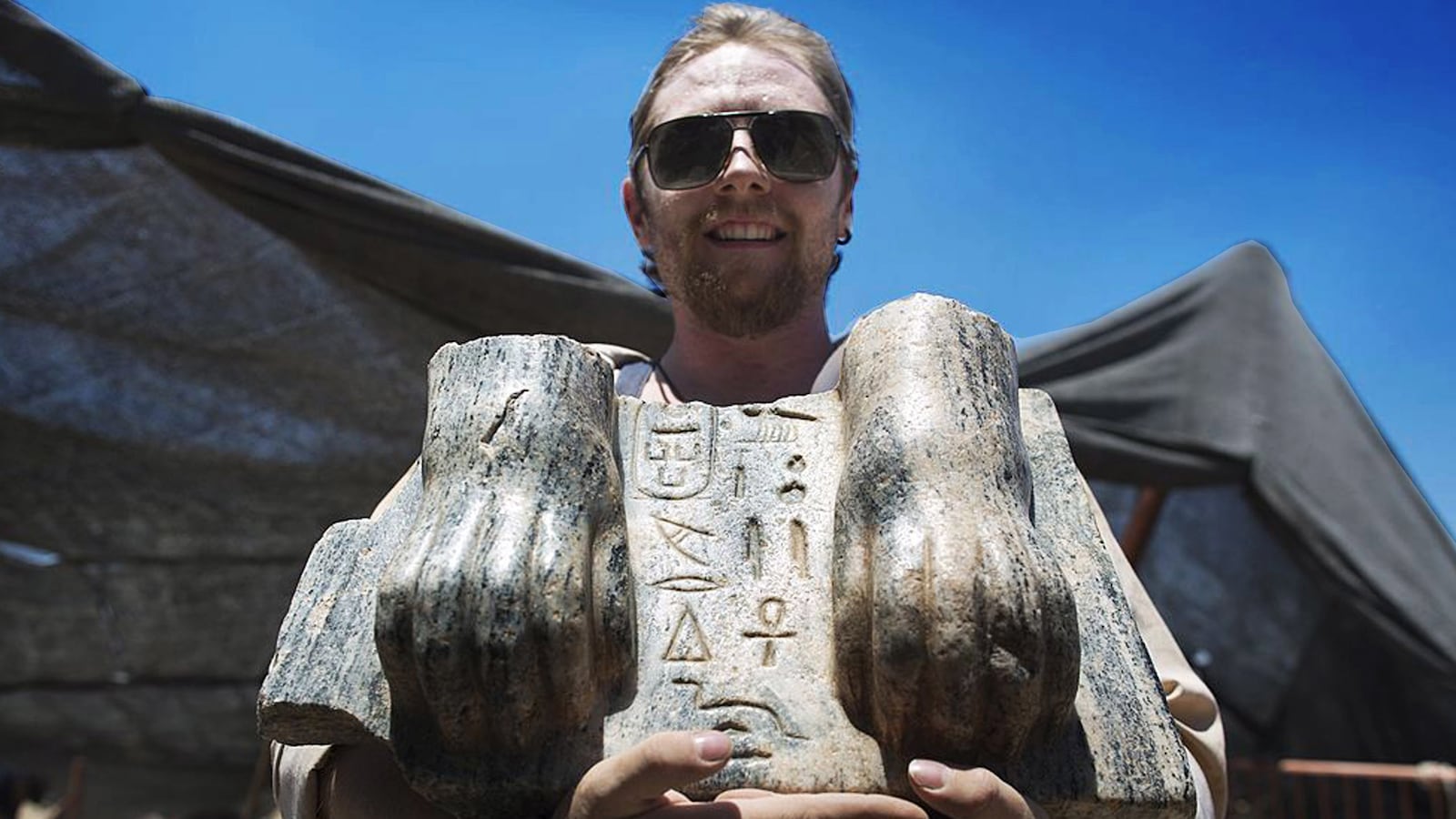When it comes to the prototypical villains of ancient literature, the Egyptians are right up there. Nobody, it seemed, really liked the ancient superpower. Ancient Greek romance novels routinely portray them as cunning and duplicitous. The Romans found Cleopatra to be equal parts captivating and conniving and, in the Bible, the Israelites were enslaved by the Pharaohs for centuries.
A new discovery at Tel Hazor, a UNESCO World Heritage Site and one of the largest Biblical-era archaeological sites in Israel, may change how we think about the Egyptians. During excavations last week, archeologists discovered a 4,000-year-old fragment of a large limestone statue of an Egyptian official. Only the lower section of the statue survives, but it includes the official’s foot and a few lines in Egyptian hieroglyphic script.
The preliminary study of the artifact has not yet been completed, so archaeologists do not even know the official’s name. Professor Amnon Ben-Tor of Hebrew University’s Institute of Archaeology, who has worked at the site for over 27 years, told the Jerusalem Post that it is likely that the statue was originally placed at the official’s tomb or in a temple.
So far Tel Hazor is the only archaeological site in the Levant to have yielded any large Egyptian statues from the second millennium BCE. The only other is a sphinx fragment of the Egyptian Pharaoh Menkaure (known to the Greeks as Mycerinus) that dates to the 25th century BCE. In the Amarna period—a period of Egyptian history when the royal residence shifted to Akhetaten and Egyptian religion temporarily shifted towards monotheistic worship of the sun god Aten—most of Canaan (what would later be Israel) was under Egyptian control. The latest finds are especially interesting because historians were unaware that Hazor was one of the Egyptian strongholds in this period or that there was ever an Egyptian official there.
What’s interesting about the Egyptian presence in Canaan in the second millennium is that it may make sense of one of the biggest mysteries of the Bible: Why does the Hebrew Bible highlight the oppression of the Israelites by Egypt when there is so little evidence for their enslavement there?
The story, as told in the book of Exodus and Prince of Egypt, is that the Israelites came to Egypt because of famine. They initially prospered (think Joseph and his technicolor dreamcoat) only to be enslaved by later generations of Egyptians. There they remained until the birth of Moses, the 10 plagues, and the eventual emancipation of the Hebrews.
Scholars have been skeptical about the historicity of the Exodus for over 70 years. In the first place the Egyptians, who were fairly remarkable record keepers, never refer to a mass exodus of slaves or even a large group of runaway slaves. To this we might add the lack of evidence for either a slaughter of Hebrew infant boys or the 10 plagues that befell the Egyptian people (during which the eldest son of every Egyptian family dies overnight). There’s also no mention of Moses, even though his name is Egyptian in origin. Finally there’s no archaeological evidence to support the idea of a mass exodus of people. When large groups of people traveled in the pre-eco-friendly age they left behind trash, and a lot of it. But there’s no archaeological evidence for mass migration from Egypt to Israel: no pottery shards or Hebrew carvings.
All of which is to say that if there was a historical enslavement in and subsequent exodus from Egypt it is highly unlikely that it was on the scale of the Biblical account. Perhaps small groups escaped slavery and came to the land that would become Israel, but certainly not 600,000 men (plus wives and children). Modern scholars like David Wolpe have been strongly attacked for making this argument, but, as Wolpe himself notes, this evidence doesn’t negate the claims of modern Jews to the land of Israel.
But it does raise an interesting historical question: If the Exodus didn’t take place on an epic Charlton Heston scale, how does Egyptian oppression come to feature so prominently in the biblical narrative? When the story of the exodus was written down in the first millennium, the Israelites wouldn’t have had any direct experience of Egyptian power for hundreds of years; in the meantime, the great empires of Assyria and Babylonia had come to power, drastically overshadowing any threat from Egypt. Why make the Egyptians the villains of the piece?
Perhaps the biblical description of dominance by Egyptians actually has very little to do with enslavement and more to do with the cultural memory of the more distant Amarna period in Canaan. The Israelites were never subject to national enslavement in Egypt; but, as this new discovery reminds us, the land of Canaan was under the foot of Pharaonic authority. The long shadows of that experience might help explain why—in the absence of a historical Exodus—the biblical authors made the Egyptians the villains of their national epic.






